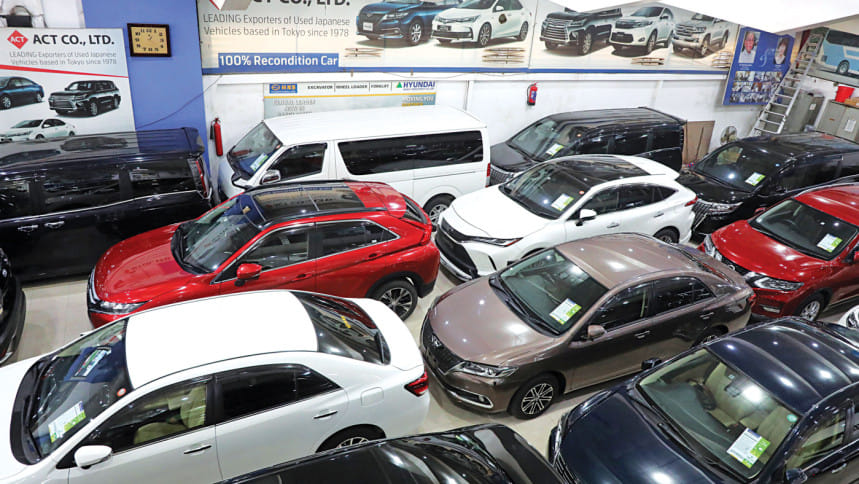Auto policy utility yet to be realised

Initiatives expected over the manufacture of automobiles in Bangladesh is yet to become visible in spite of the unveiling of a policy by the government for the first time in 2021 to develop the sector.
Industry insiders said local investors involved in the sector were interested in assembling instead of manufacturing to avoid risks associated with big investments.
Through the formulation of Automobile Industry Development Policy 2021, the government sought to cut overreliance on imported vehicles, switch to electric modes of transportation and become a regional hub for automobile manufacturing by 2030.
The government has the intent to attract both local and foreign investments and standards will be set for locally manufactured vehicles keeping with global benchmarks, it adds.
In alignment with the policy, the National Board of Revenue (NBR) issued three circulars on June 1, 2022.
Those exempted imports of spare parts and other equipment meant for manufacturing of automobile from value added tax and supplementary duty until June 30, 2030.
However, investors who want to avail this benefit must set up necessary machineries and equipment for the manufacture of vehicles, said the NBR.
It will also be mandatory for manufacturers to register with Bangladesh Investment Development Authority (Bida) and Bangladesh Economic Zones Authority (Beza).
A Bida analysis states that Bangladesh was one of the most promising markets for the expansion of four-wheelers.
The number of automobiles registered annually has more than doubled since what was in 2013, reaching to around 26,000 passenger vehicles and 37,000 commercial ones.
Growing purchasing power of the middle-income population is believed to be spurring passenger vehicle registration.
Bida's analysis said the annual market demand was expected to cross 100,000 vehicles by 2024, which was commercially viable for investments.
There are at least 10 automobile plants working with completely knocked-down kits in Bangladesh, including Pragoti Industries, PHP Automobiles, Nitol Motors, Pacific Motors, Energypac Motor Vehicle Division, ACI Motors, and Fair Technology.
Besides, local company Bangladesh Auto Industries is setting up a manufacturing unit for electric vehicles at Bangabandhu Sheikh Mujib Shilpa Nagar in Chattogram.
"We already invested over Tk 250 crore, and need more Tk 250 crore to complete the project," Mir Masud Kabir, managing director of Bangladesh Auto Industries, told The Daily Star.
He expects to have the factory established by the first quarter of next year and go into commercial production by mid-2023.
"We will manufacture one model of a hatchback, sedan and sports utility vehicle, two models of a multipurpose vehicle (microbus), three models of a two-wheeler, and two models of a three-wheeler," he said.
According to Kabir, the government should provide further policy support to develop the industry over the next 20 years.
The existing policy was for up to 2030, meaning around eight years from now, which was not enough time to grow a new sector, he said.
Hafizur Rahman Khan, chairman of Runner Group, said, "We have installed a manufacturing plant for three-wheelers on the basis of the policy."
"We will start trial production soon to provide 'made in Bangladesh' three-wheelers," he said, informing that the plant was set up through a joint venture with an Indian automobile giant.
Referring to the policy, he said the government discouraged import of completely built-up units of used vehicles as locally assembled cars would be more affordable.
Abdul Matlub Ahmad, chairman of Nitol Niloy Group who is highly interested in establishing a truck and double cabin pick up plant, thinks the policy would help Bangladesh become an automobile manufacturing nation.
"Customers will benefit as they will get vehicles at affordable prices," he said.
He, however, believes things were yet to start to materialise for the pandemic and the ongoing global economic crisis.
These were certainly a roadblock to the progress of a project of Tata Motors and Nitol Niloy Group over the assembly of "specialised pickup trucks" in Bangladesh, he said.
Ahmad said they had a target to start assembling 800 pickup trucks per month at a factory of joint venture Nita Company in Kishoreganj and manufacture at least 25 per cent of the components in Bangladesh by 2020.
The company's existing plant in Jashore can assemble small pickups and other trucks.
However, there was still hope as Ahmad said they had not cancelled their initiative.
Subrata Ranjan Das, executive director, ACI Motors, said they have taken an initiative to set up an assembly plant for commercial vehicles through a joint venture with a Chinese automaker.
He said the government initiative to support the automobile sector was really positive and encouraging for investors.
However, the government should extend incentives and duty and tax waivers by at least another 10 years, he said.
Earlier in January 2021, Ruhul Alam Al Mahbub, managing director of Fair Technology, sole distributor of Hyundai Motor Company in Bangladesh, announced that it would set up a manufacturing plant to provide brand new Huyndai cars at reasonable prices.

 For all latest news, follow The Daily Star's Google News channel.
For all latest news, follow The Daily Star's Google News channel. 



Comments